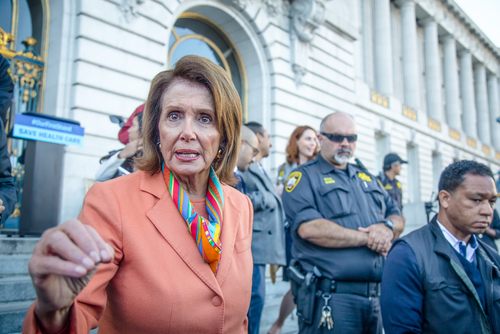Nancy Pelosi’s criticism of President Biden’s late exit from the presidential race ignites a firestorm within the Democratic Party following Kamala Harris’s unexpected defeat to Donald Trump.
Pelosi’s Bombshell Critique Rocks Democratic Party
In a stunning turn of events, former House Speaker Nancy Pelosi has publicly criticized President Joe Biden’s role in the recent electoral defeat of Vice President Kamala Harris to Donald Trump. Pelosi’s comments have sent shockwaves through the Democratic Party, exposing deep-seated tensions and disagreements within its ranks.
Rep. Nancy Pelosi, D-Calif., on Friday expressed frustration with President Joe Biden's late exit from the presidential race, saying it hurt Vice President Kamala Harris's campaign.https://t.co/a5EmYjaKI0
— WSBT (@WSBT) November 11, 2024
Pelosi, in a recent interview, pointed to Biden’s late exit from the presidential race as a key factor in Harris’s loss. She stated, “Had the president [Biden] gotten out sooner, there may have been other candidates in the race.” This critique suggests that Biden’s delayed departure limited the party’s options and potentially weakened their electoral chances.
.@SpeakerPelosi suggested Vice President Kamala Harris lost the general election due to President Joe Biden's late exit from the presidential race and bemoaned the lack of an open primary. | @dezward01 https://t.co/NDbsegFvIs
— National Review (@NRO) November 10, 2024
.@SpeakerPelosi suggested Vice President Kamala Harris lost the general election due to President Joe Biden's late exit from the presidential race and bemoaned the lack of an open primary. | @dezward01 https://t.co/NDbsegFvIs
— National Review (@NRO) November 10, 2024
Trump’s Clear Victory Sparks Democratic Soul-Searching
The election results left no room for doubt, with Donald Trump securing key battleground states and winning both the electoral and popular votes. This clear-cut victory has forced Democrats to confront the reasons behind their loss and reevaluate their strategy moving forward.
“It should come as no great surprise that a Democratic Party which has abandoned working class people would find that the working class has abandoned them. While the Democratic leadership defends the status quo, the American people are angry and want change, And they’re right.” – Bernie Sanders
Bernie Sanders’ scathing critique of the party’s approach to working-class issues has added fuel to the internal debate. However, Pelosi strongly disagreed with Sanders, defending the party’s stance on working-class families. This public disagreement highlights the growing divide within the Democratic leadership on how to address the concerns of blue-collar voters.
Biden’s Late Exit and Its Consequences
Biden’s decision to drop out of the race in July, following a poor debate performance, set off a chain of events that ultimately led to Harris’s nomination. Pelosi suggested that this late exit prevented a more open primary process, potentially denying other strong candidates the opportunity to compete for the nomination.
“With all due respect, and I have a great deal of respect for him [Sanders], for what he stands for, but I don’t respect him saying that the Democratic Party has abandoned the working class families. That’s where we are.” – Nancy Pelosi
The timing of Biden’s endorsement of Harris shortly after his withdrawal further complicated matters. This swift transition left little room for other potential candidates to gain traction, effectively cementing Harris as the party’s nominee without the benefit of a robust primary contest.
A Party Divided: Finger-Pointing and Self-Reflection
In the aftermath of the election, various factions within the Democratic Party have engaged in a blame game. The Harris and Biden campaigns reportedly pointed fingers at each other, while former President Obama and his allies faced criticism for their role in encouraging Biden’s exit and their delayed endorsement of Harris.
Democratic strategist David Axelrod raised concerns about the party’s shift away from blue-collar voters, echoing Sanders’ sentiments. This internal discord reflects a broader debate within the party about its identity and electoral strategy moving forward.
Looking Ahead: Challenges for the Democratic Party
As Democrats grapple with the fallout from this electoral defeat, they face several key challenges. The party must address the perceived disconnect with working-class voters, reevaluate its primary process, and find ways to unite its various factions behind a common vision.
Pelosi’s public criticism of Biden and the nomination process signals a potential shift in party dynamics. As the Democrats look to rebuild and prepare for future elections, they will need to navigate these internal divisions while presenting a united front to the American people.

